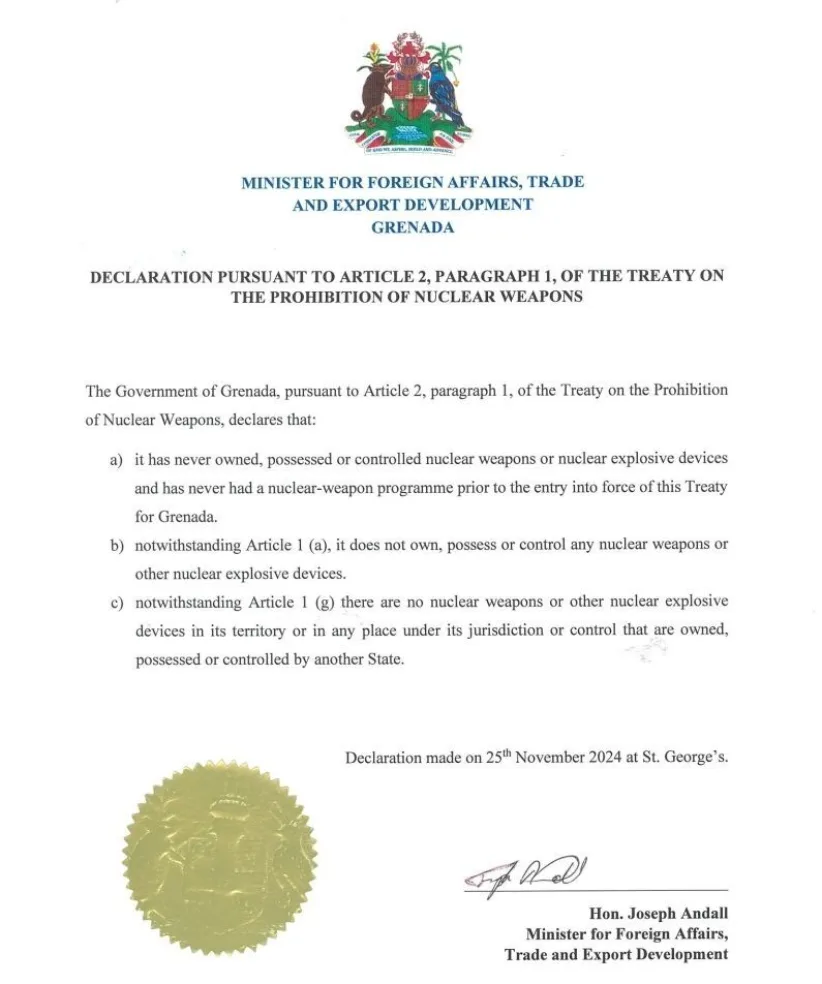The obligation to submit declarations
The UN Secretary-General received three Article 2 declarations during the course of 2024: from Grenada, Sao Tome and Principe, and Sri Lanka. At the end of 2024, no submission was outstanding. The three newest states parties—Indonesia, Sierra Leone, and Solomon Islands—all had deadlines in January 2025 to submit the declaration required by the Treaty on the Prohibition of Nuclear Weapons (TPNW) , and they all met these deadlines.

Sao Tome and Principe submitted its declaration on 27 March 2024, in advance of its deadline on 14 May 2024. Sri Lanka’s declaration was received by the UN Secretary-General the day after the country’s deadline on 17 January 2025. Grenada’s declaration had been due in October 2022 and was submitted on 25 November 2024. The declarations of the three states confirmed that they have never owned, possessed, or controlled nuclear weapons or other nuclear explosive devices, and that foreign nuclear weapons or other nuclear explosive devices are not located in its territory or in any other place under their jurisdiction or control.
Indonesia, Sierra Leone, and the Solomon Islands all ratified the TPNW on 24 September 2024 and the Treaty entered into force for them on 23 December 2024. Accordingly, their 30-day deadline to submit their declarations to the UN Secretary-General was set to 22 January 2025.
The UN Office for Disarmament Affairs (UNODA) receives the declarations on behalf of the UN Secretary General and transmits them to the other states parties. It also posts the declarations on its website, at: https://disarmament.unoda.org/...
The state profiles of the Nuclear Weapons Ban Monitor also record the dates the declarations are received by the UN, or indicate that a state party has not yet submitted its requisite declaration.
The TPNW does not prescribe a standard form or format for the declarations, but the UNODA website for the Treaty contains model declarations in English, French, and Spanish prepared by the International Committee of the Red Cross.
ARTICLE 2 - INTERPRETATION
- Article 2 of the TPNW imposes a duty on each state to submit a declaration to the UN Secretary-General within 30 days of becoming party to the Treaty. The declaration must clarify whether the state party has ever owned, possessed, or controlled nuclear weapons or other nuclear explosive devices. If it has, it must further declare whether it has already eliminated its nuclear-weapon programme, including by destroying or irreversibly converting all nuclear-weapons-related facilities, or whether it still owns, possesses, or controls any nuclear weapons or other nuclear explosive devices.
- Finally, the declaration must state whether foreign nuclear weapons or devices are located (stockpiled, stationed, deployed, or installed) either in the state party’s territory or in any other place under its jurisdiction or control.
- The overwhelming majority of potential states parties are not nuclear-armed. Once the requisite Article 2 declaration has been submitted by a non-nuclear-armed state party, the only other reporting duties under the TPNW will be those to which it commits under an action plan adopted by a meeting of states parties.
- For potential states parties that formerly possessed or which currently possess nuclear weapons and for states that have foreign nuclear weapons on their territory or in any other place under their jurisdiction or control, Article 4 of the TPNW imposes a duty to submit a report to each meeting of states parties and each review conference on progress towards the implementation of its obligations under that article. This obligation persists until the obligations under Article 4 are fulfilled.